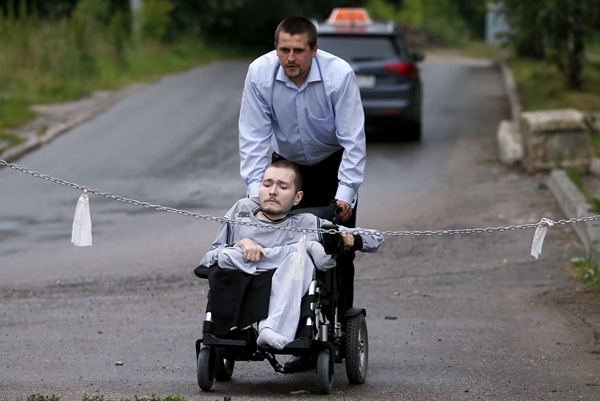First human head transplant may be carried out in 2017 in China
Updated: 2015-09-15 16:25
By Wu Yan(chinadaily.com.cn)
|
|||||||||||
 |
|
Valery Spiridonov is assisted before a news conference in Vladimir, Russia, June 25, 2015.[Photo/Agencies] |
What is a head transplant?
A head transplant is taking a living head and putting it onto a new body.
But actually, it's a body transplant, as the head will be gaining a new body to control. However, as the term "whole body transplant" is already used to mean transferring the brain between bodies, calling it a "head transplant" makes it clear that the whole head is to be switched, brain included.
How would Canavero's human head transplant work?
The donor body and the head to be attached are first cooled down to 12-15˚C to ensure that the cells last longer than a few minutes without oxygen. The tissue around the neck is then cut, with the major blood vessels linked with tiny tubes. The spinal cord on each party is then severed cleanly with an extremely sharp blade.
At this point, the head is ready to be moved, and the two ends of the spinal cord are fused using a chemical called polyethylene glycol, encouraging the cells to mesh.
After the muscles and blood supply are successfully connected, the patient is kept in a coma for a month to limit movement of the newly fused neck, while electrodes stimulate the spinal cord to strengthen its new connections.
Following the coma, Canavero anticipates that the patient would immediately be able to move, feel their face and even speak with the same voice. He believes physiotherapy would allow the patient to walk within a year.
What does the scientific community make of the human head transplant?
Dr Hunt Batjer has attracted headlines for being particularly blunt: "I would not wish this on anyone. I would not allow anyone to do it to me as there are a lot of things worse than death."
Dr Jerry Silver witnessed the 1970s monkey head transplant experiment and describes the procedure as "bad science", adding that "just to do the experiments is unethical".
Dr Chad Gordon, professor of plastic and reconstructive surgery and neurological surgery at Johns Hopkins University, agrees that Canavero's claims are scientifically implausible.
Dr Paul Myers, associate professor of biology at the University of Minnesota at Morris, puts it even more explicitly: "This procedure will not work... Try it with monkeys first. But he can't: the result would be, at best, a shambling horror, an animal driven mad with pain and terror, crippled and whimpering, and a poor advertisement for his experiment. And most likely what he'd have is a collection of corpses that suffered briefly before expiring."
Others wonder whether Canavero might simply be enjoying the limelight with a PR stunt, including Dr Arthur Caplan, director of ethics at the NYU Langone Medical Centre. Describing the doctor as "nuts," he explained to CNN: "Their bodies would end up being overwhelmed with different pathways and chemistry than they're used to, and they'd go crazy."
Related Stories
Chinese surgeon uses 3D printing to map out difficult heart surgery 2015-08-18 16:49
China completes first kidney re-transplant operation 2015-02-04 10:10
Overhauling China's organ transplant system could take some time 2015-01-08 13:48
Mother with womb transplant says risk paid off 2014-10-04 21:29
Lung transplant operation on man, 81, may be world record 2014-08-15 16:10
3D print tech involved in Beijing axis surgery 2014-08-19 13:13
Today's Top News
Cameron urges support for Syrian refugees
Hungary launches border crackdown amid refugee crisis
China, Belgium have great potential in nuclear power generation
China will have 500,000 foreign students by 2020: Vice-Premier
Georgian Prime Minister awarded honorary professorship
Border-free Europe unravels in migrant crisis
Refugee crisis: Germany re-imposes border controls
Australia gets new PM as Abbott loses out to rival Turnbull
Hot Topics
Lunar probe , China growth forecasts, Emission rules get tougher, China seen through 'colored lens', International board,
Editor's Picks

|

|

|

|

|

|






